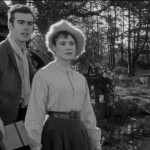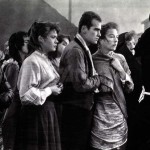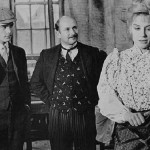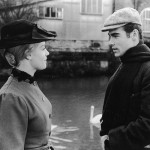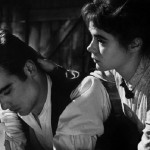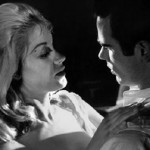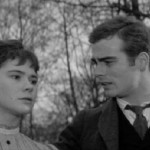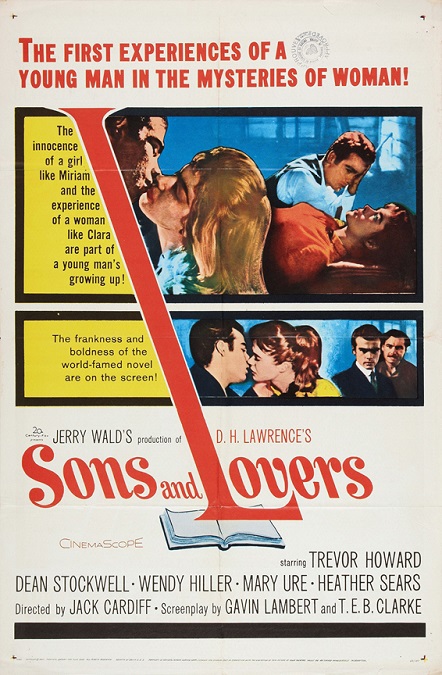
Sons and Lovers – 1960
This was a little British film whose major themes appeared to be young love, sexual frustration and repression, and dysfunctional families. It starred Dean Stockwell as Paul Morel, Wendy Hiller as his long-suffering mother, Gertrude, Trevor Howard as Walter, his violent, alcoholic father, Heather Sears as Miriam Leivers, his sexually repressed childhood sweetheart, and Mary Ure as Clara Daws, his married lover. The film could so easily have been melodramatic and too much like a sappy soap-opera, but director Jack Cardiff took it in a serious and insightful direction.
The story took place in Nottingham, England, a coal-mining town, in the early 20th century. Paul Morel is a young boy who wants to be an artist and has the natural talent to become one. His mother, who has found no joy in her marriage to a man she no longer loves, focuses all her attentions on him, manipulating his life in the name of motherly love, so that he can never have a healthy relationship with another woman.
Miriam, Paul’s girlfriend, has been raised under the boot-heel of her overly-religious mother who believes that sex is a dirty thing that is only to be endured for the purpose of procreation. She pushes Paul away any time he starts to get too physically close. Sears did a good job with her part, portraying a fear of intimacy, and shame for her desire for intimacy.
Paul gets a job in a factory, instead of the mines, like his father and grandfather, a fact which makes Walter feel like his family looks down upon him. Paul begins a physical relation with a sexually liberated woman who happens to be married. His mother, in an unconscious effort to put an end to his love affair, becomes ill and dies, forcing Paul to realize that all his emotional efforts had really been focused on her instead of on Clara. As a result of Gertrude’s death, Paul decides that he will never again have a serious relationship with any woman. The end.
As it turns out, this seems like it was the perfect film to start off the 60s, the era of free love and the sexual revolution. The problems it dealt with seemed to be very relevant to the times. The world, like the main character of Paul, seemed to be searching for freedom from the past generation, like a child yearning to stretch its legs and run. The film successfully looked at this desire for sexual liberation from a number of different angles.
The actors all did a great job and I have to give a special nod to both Trevor Howard and Wendy Hiller for some wonderful performances. Howard played the part of a low-born man who feels unloved and unwanted by his family, as his sons express their desires for lives of their own that are not fashioned after his. Even his wife can’t stand to be in the same room with him. The actor did a great job of portraying the emotional roller-coaster of the depressed alcoholic.
At first, I didn’t understand that one of the biggest themes in the movie was the codependent relationship between Paul and his mother, but the more I think about it, the more I realize that Paul’s emotional failings all stemmed from that relationship. Hiller’s performance was subtle, but the character’s motivations were all quite evident. I almost missed the little ways she discouraged him from seeing Miriam, saying that the girl wanted him all to herself and that he would never be happy with her. I almost overlooked the way she told him he would never be happy with a married woman who could never truly be his. I almost failed to understand how she actually turned him against his father in subtle and yet effective ways. The part was well written and well played.
I wouldn’t say that the film was great, but it was definitely good. Sure, the ending was a little depressing, but I felt it was realistic. Paul walks away from Miriam, saying that he will never love again. But who, after losing the love of their life, hasn’t thought the same thing? Except that in this messed-up Oedipal case, his love is his mother. I tend to think that the statement was only the impassioned declaration of a troubled young man. Time heals all wounds, and Paul will eventually discover that love is still not only possible, but needed.
And just as a side note: This film displays how the style for feminine beauty was slowly becoming that classic 60s look. Even though the story took place in the early 1900s, Ule’s bouffant hairstyle was hard to miss.
